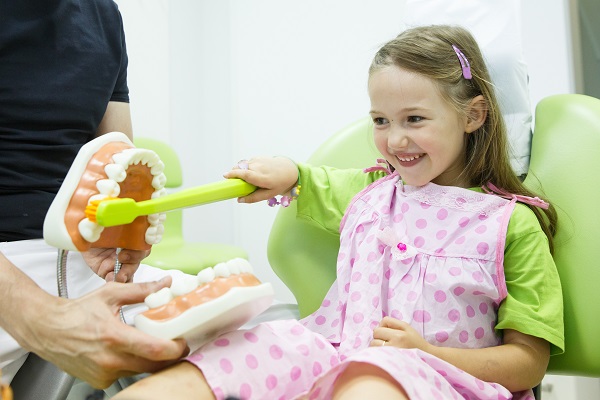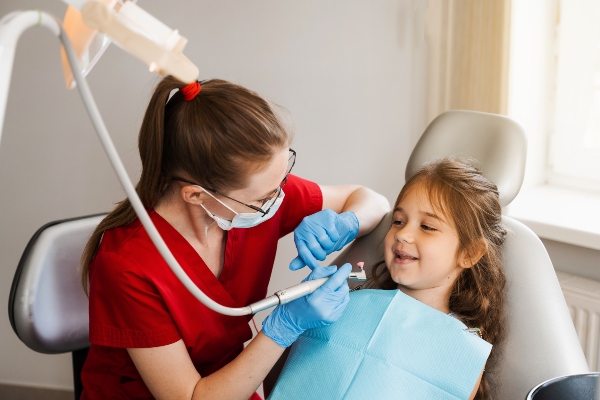A Guide to Children and Fluoride Use from a Pediatric Dentist

When it comes to dental decay, a pediatric dentist may recommend fluoride use as a prevention strategy. Tooth decay is the most common disease among children. The American Dental Association recommends fluoride for strengthening the enamel and preventing cavities.
How fluoride works
Fluoride works well against cavities via topical and systemic deliveries. It prevents tooth demineralization, promotes remineralization and hinders bacterial metabolism. A study published in the Materia Socio-Medica found that fluoride inhibits bacterial fusion with the teeth. The topical application of fluoride provides the most benefits. Systemic use includes things like fluoridated drinking water. This helps to solidify the enamel and promote its resistance to demineralization.
The recommended type of fluoride
Pediatric dentists recommend topical application of fluoride during tooth development. This includes toothpaste or varnish for children. The American Academy of Pediatrics (AAP) also suggests dietary fluoride supplements for children who do not get enough fluoride in their drinking water. The AAP recommends fluoride dental rinses for children above 6 years old who are more prone to having dental caries.
Guide for topical use
Toothpaste
Fluoride toothpaste is recommended from the eruption of the first tooth until adulthood. From tooth eruption until your child turns 3 years old, you should only give your children a rice-sized amount of fluoride toothpaste. This is enough for brushing in the morning and night. When the child is above age 3 or can effectively spit without supervision, they should be given a pea-sized amount of toothpaste.
Teach your child to spit after brushing. The water used for rinsing after brushing should be limited to promote proper fluoride contact with the teeth. Fluoride toothpaste should be stored away from children’s reach. Ingestion of toothpaste usually causes an upset stomach but can require medical treatment.
Dental rinses
Fluoride rinses can be helpful for children who are prone to dental cavities or live in communities without fluoridated water. Dental rinses are only recommended for high-risk children above age 6 who can rinse and spit without supervision. Parents should avoid buying rinses with alcohol for their children. Fluoride mouthwashes, supplements and gels can be used to complement brushing. Ask your dentist before adding this to your child’s dental care routine.
Varnish
This is highly concentrated fluoride that is applied topically on the teeth by a dental professional. Fluoride varnish is useful for reducing the incidence of cavities significantly. Dentists recommend that children should get varnish once their teeth start erupting every three to six months. This can change based on your child’s susceptibility to dental caries. Applying varnish is simple and straightforward, so your child has nothing to fear.
Protect your child’s teeth
Be sure to limit your child’s fluoride use during tooth development, as that could cause fluorosis. It creates white lines and streaks on the teeth, which can cause your child to be self-conscious. Learn more about how to properly care for your child’s oral health by scheduling a consultation with our pediatric dentist.
Request an appointment here: https://www.hvkidsmiles.com or call Hudson Valley Pediatric Dentistry at (845) 363-4177 for an appointment in our Middletown office.
Check out what others are saying about our services on Yelp: Read our Yelp reviews.
Recent Posts
Dental fillings are a key part of protecting children’s oral health. When prevention efforts fail, this simple procedure stops cavities from doing further damage to dental health. Here, we take a closer look at the benefits of treating childhood tooth decay with dental fillings for kids.According to the Centers for Disease Control and Prevention (CDC),…
Cavities are a common dental health issue, and as kids learn to care for their teeth, they are often more prone to developing them. Dental fillings for kids can help avoid future oral health complications and protect their young smiles. Here are the basics of the treatment process that you should know as a parent…
Curious about dental fillings for kids? Read on to learn more. As your kid ages, you most likely have many questions about their overall health. Questions like "Are dental fillings for kids necessary?" or "What happens to baby teeth with nontreated cavities?" These are crucial questions to think about, and this article addresses them so…
Lip tie laser surgery can sound like a modern, gentler option, while a scissor frenectomy often feels simpler and more familiar. Both approaches aim to release a restrictive upper labial frenulum when symptoms and clinical findings support treatment. A pediatric dental evaluation should focus on function first, since many frenula look prominent but cause no…


